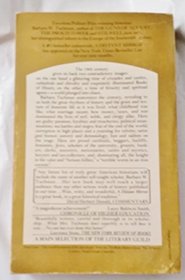Helpful Score: 4
I can't recommend this book enough. It's gripping history in itself, but Tuchman weaves a tapestry of the era that informs, amuses, and horrifies. She is adept at making the reader relate to faraway events and shining a light on their relevancy in the modern world.
Helpful Score: 2
A history book like you have never read, reads like a novel. The subtitle is "The Calamitous 14th Century." Barbara Tuchman anatomizes the century, revealing to us both the great rhythms of history and the grain and texture of domestic life as it was lived: what childhood was like; what marriage meant; how money, taxes, and war dominated the lives of serf, noble, and clergy alike. Here are guilty passions, loyalties and treacheries, political assassinations; sea battles and sieges; fear of the end of the world; corruption in high places and a yearning for reform; satire and humor; sorcery and demonology; lust and sadism on the stage. Here are proud cardinals, beggars, bailiffs, feminists, Jews, scholars of the university, grocers, banders, clerks, sorcerers, mercenaries, saints and mystics, lawyers and tax-collectors, and, dominating all, the knight in his valor.
Helpful Score: 1
Tuchman's book presents a thourough, redable account of the fourteenth century and its major events (the Black Death and the start of the Hundred Years' War, for starters). While a few of the details of medieval life included in the book have inevitably been superceded by more recent research, this is more than made up for by the book's many strong points.
Tuchman's prose is clear and far from textbook-like, but without seeming to make a point of it, and her decision to follow the life of one of the more important participants in many of the century's numerous wars/battles/etc. unifies the narration much more than would be possible otherwise. She also draws enough comparisons to more recent history (many from the two World Wars) to explain how and why events unfolded.
Given the book's length (it took me several weeks to read, despite reading over lunch and a good-sized commute) I can't really recommend it to someone who really wants to know about particular events of the 1300s. Many good books have been written about both the Hundred Years' War and Black Death. But if you're looking for a history of the century as a whole, rather than just the plague or the war, this is a good book.
Tuchman's prose is clear and far from textbook-like, but without seeming to make a point of it, and her decision to follow the life of one of the more important participants in many of the century's numerous wars/battles/etc. unifies the narration much more than would be possible otherwise. She also draws enough comparisons to more recent history (many from the two World Wars) to explain how and why events unfolded.
Given the book's length (it took me several weeks to read, despite reading over lunch and a good-sized commute) I can't really recommend it to someone who really wants to know about particular events of the 1300s. Many good books have been written about both the Hundred Years' War and Black Death. But if you're looking for a history of the century as a whole, rather than just the plague or the war, this is a good book.




